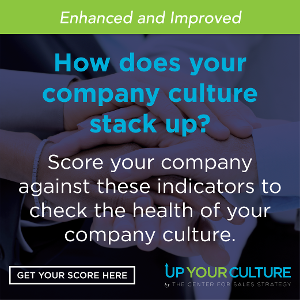
Corporate culture has arguably always been important, but in recent years it’s become a popular point of discussion. To some, it’s become a buzzword, with an overabundance of content and discussions surrounding it. However, our 2019 Media Sales Report revealed some telling information related to how salespeople and sales managers feel about the culture of their company and industry today.
Company culture is becoming even more important as the modern workplace continues to evolve. This is proven throughout the report as the biggest takeaways are related to how prepared salespeople feel to face the future and how likely they’ll be to recommend their company as a great place to work.
Culture Matters
 Have you ever noticed that some jobs feel like they were made just for you and others don’t fit at all?
Have you ever noticed that some jobs feel like they were made just for you and others don’t fit at all?
For example, in college, I worked in a really cool restaurant with delicious food and one of the best reputations in town. I loved eating and hanging out there, so I assumed I would love working there just as much - but I was wrong. After only a short time on the job, I realized I was a round peg trying to smash myself into a square hole, and that would never benefit me or the company. I didn’t fit because my values were too different; my personality didn’t align with the personality of the business. Turns out I wasn’t the only one that felt that way. The restaurant suffered from so many turnover and performance issues that, even though the food was awesome, they ended up closing their doors. It was a clear failure to develop a strong company culture.
We all have a story like this to tell. And, whether we realized it or not, company culture shapes our minds and the way we perceive career opportunities. As we mature in our careers, especially our sales careers, we realize there are undeniable benefits of a strong, unified company culture, such as:
- Identity. Culture contributes to the identify and values of you and the company. For example, if the corporate culture is one that prioritizes setting and meeting goals, you will strive to set and meet goals of your own. It’s a good way to set and maintain direction, and without it, it’s hard to keep your company’s values coherent.
- Retention. A strong company culture attracts better talent and, more importantly, retains that talent. When people feel like they belong to an organization, they’re more likely to stick around for the long term. That means lower turnover, fewer new hires, and better chemistry among your team.
- Image. Company culture also adds to the brand identity of your organization. If you treat employees well and have a fun-loving corporate atmosphere, your customers and clients will see you as a fun-loving, generous brand. Depending on your target demographics, that could be a major boost for sales and customer loyalty.
What is Company Culture?
Merriam Webster tells us company culture is a way of thinking, behaving, or working that exists in a specific organization. At The Center for Sales Strategy (CSS) and Up Your Culture, we like to think of it as “the way we do things around here.”
Culture is both the cause and the effect of every choice you make as a business. In other words, your company culture gives you the guard rails you need to make strong decisions and then the decisions you subsequently make continue to shape your culture.
Company culture has always been incredibly important, but it’s much trendier today than ever before. Today, successful companies realize that in order to rise above industry benchmarks and outperform the competition, they must have a clear understanding of who they are as a company. That understanding of:
- Who they are
- What they are doing
- Why they are doing it
- How they will behave along the journey
All allows them to consistently and swiftly move in the right direction. It also allows them to more easily attract and hire top talent to support them on their mission. Picture a rowing team, all sitting in position in their boat, facing the stern and rowing in unison to create maximum propulsion. That’s what a company with a strong culture should feel like.
2019 Media Sales Report Culture Statistics
Good news! The 2019 Media Sales Report showed that 4 out of every 5 managers surveyed expressed a belief that their organization is equipped to be competitive in the coming year. That means they believe their company has the vision, the people, and the resources necessary to succeed and everyone is rowing in the same direction. That’s a strong number!
The data for salespeople is not quite as high, showing that only 64% of sellers share that same level of optimism. One of the things we’ve learned over the years of working with companies to develop top talent and improve company culture is that communication is key. Companies that are more transparent and share more information with their employees, generate a higher level of confidence in the building.
When less information is shared, that vacuum is filled with uncertainty and doubt. The takeaway here is clear. A strong company culture includes increased communication and transparency, allowing all employees to know where they are headed and more confidently row together. We believe strongly that if these sales managers and other leaders within the companies provided more information down the line, they would see both confidence and optimism quickly rise.
Employee Engagement Statistics
The more concerning news that came out of this report relates to employee engagement and loyalty. We define employee engagement as “an emotional commitment and a willingness to give your best at work.”
Strong employee engagement does not mean employees feel happy all the time—although an engaged workforce does have higher morale. Rather it means that employees feel as though they have a stake in the game and a strong sense of purpose. They know what they’re playing for and what they’ll win, and they’re willing to give everything they’ve got to achieve that success. You can hire the most talented people in the world, but if they’re not engaged, the company won’t benefit from that talent at all.
A quick but powerful way to take a litmus test of an employee engagement is to ask a question like, “Would you recommend this company as a great place to work for a friend or family member?” The answer will provide company leaders with a small but potent drop of information about how connected people feel to the company and how much of their “full self” they are likely putting into their work each day.
Engaged vs. Disengaged Employees
Disengaged employees drag themselves in to work each day, merely going through the motions. That means that, regardless of how talented they are, they won’t fully active their talents or reach their potential. And they certainly won’t recruit those they care about to join them.
Engaged employees on the other hand, will shout it from the roof tops. They post positive things about their company on social media because they can’t help but share how energized they feel, and that energy can be seen in their levels of productivity as well.
Highly engaged employees will fully activate their talents and work to reach their full potential in their jobs. They also attract other top performers, often sharing job opportunities with those they care about.
You Can Fix Your Company Culture
Company culture and employee engagement is a fixable problem that needs attention immediately. The 2019 Media Sales Report reinforced the fact that companies must spend time right now working to understand their level of employee engagement and identify their current company culture.
After putting those two things under the microscope, they should celebrate what they’re doing well, identify their areas of opportunity, and work to make culture improvement changes. There’s a clear-cut recipe to create a culture of engagement, and this is the year for companies to commit to the process and create the kind of environment in which their people thrive!




